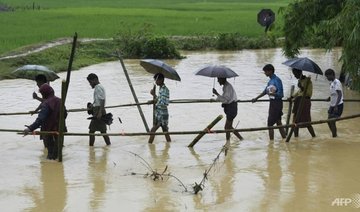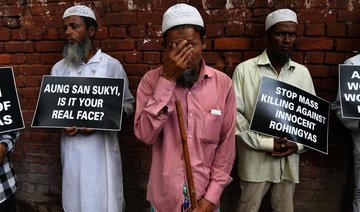YANGON: Pressure grew on Myanmar Monday as a rights group urged world leaders to impose sanctions on its military, which is accused of driving out more than 410,000 Rohingya Muslims in an orchestrated “ethnic cleansing” campaign.
The call from Human Rights Watch came as the UN General Assembly prepared to convene in New York, with the crisis in Myanmar one of the most pressing topics.
It also came on the eve of a highly-anticipated national address by Myanmar’s civilian leader Aung San Suu Kyi — her first on the Rakhine crisis.
The exodus of Rohingya refugees from mainly Buddhist Myanmar to neighboring Bangladesh has sparked a humanitarian emergency. Aid groups are struggling to provide relief to a daily stream of new arrivals, more than half of whom are children.
Myanmar has suggested it will not take back all who had fled across the border, accusing those refugees of having links to the Rohingya militants whose raids on police posts in August triggered the army backlash.
Any clear moves to block the refugees’ return will likely anger Bangladesh Prime Minister Sheikh Hasina, who will press the General Assembly to raise global pressure Myanmar to take back all the Rohingya massing in shanty towns and camps near the border.
Human Rights Watch also called for the “safe and voluntary return” of the displaced as it urge governments around the globe to punish Myanmar’s army with sanctions for the “ongoing atrocities” against the Rohingya.
“The United Nations Security Council and concerned countries should impose targeted sanctions and an arms embargo on the Burmese military to end its ethnic cleansing campaign against Rohingya Muslims,” the group said in a statement.
Myanmar’s military was hit with Western sanctions during its 50-year rule of the country. But most have been lifted in recent years as the generals have allowed a partial transition to democracy.
“Burma’s (Myanmar) senior military commanders are more likely to heed the calls of the international community if they are suffering real economic consequences,” said John Sifton, HRW’s Asia advocacy director.
Nobel peace laureate Suu Kyi has shocked the international community with her near-silence on the plight of the Rohingya and her failure to condemn the actions of the army, with whom she has a delicate power-sharing arrangement.
Speaking to the BBC over the weekend, UN Secretary General Antonio Guterres called Suu Kyi’s upcoming address a “last chance” to stop the unfolding humanitarian calamity.
But analysts say it will be difficult for her to tamp both global outrage and combustible religious tensions at home, where there is broad support among the mainly Buddhist populace for the army’s crackdown.
“I’m worried that there is almost no possibility given the political climate in Myanmar for balancing the expectations of most of the country and the expectations of the international community,” Richard Horsey, an independent analyst based in Myanmar, told AFP.
The sharp divide was on display Monday as protests broke out in Dhaka — where 20,000 demonstrators marched in solidarity with the Rohingya — and in Yangon, where a much smaller group of 300 gathered to blast global interference in the conflict.
The ultra-nationalists in Yangon braved a downpour as they waved Myanmar flags and banners describing the UN and global NGOs as “supporting organizations for the terrorists.”
While the world has watched the refugee crisis unfold with horror, there is little sympathy for the Rohingya inside Myanmar.
Many Buddhists revile the Muslim minority and have long denied the existence of the Rohingya as an ethnic group, insisting they are illegal immigrants from Bangladesh.
Suu Kyi’s government has so far defended the military campaign as a legitimate crackdown on the Rohingya militants, who first emerged as a fighting force last October.
On Sunday Myanmar’s Information Committee accused those who fled to Bangladesh — more than a third of the Rohingya population — of working in cahoots with the Rohingya militants, a rag-tag group of fighters armed with mostly rudimentary weapons.
“Those who fled the villages made their way to the other country for fear of being arrested as they got involved in the violent attacks,” the statement said.
“Legal protection will be given to the villages whose residents did not flee,” it added.
The violence has gutted large swaths of northern Rakhine in just over three weeks, with fires visible almost daily across the border from the Bangladesh camps.
Some 30,000 ethnic Rakhine Buddhists and Hindus have also been displaced by unrest in northern Rakhine, where foreign aid has been severely curtailed.
On Monday, Doctors Without Borders repeated calls for “unfettered access” to the conflict zone, saying hundreds of thousands of people are thought to be languishing “without any meaningful form of humanitarian assistance.”
UN urged to punish Myanmar army over Rohingya ‘atrocities’
UN urged to punish Myanmar army over Rohingya ‘atrocities’

Trump is living in a Russian-made ‘disinformation space,’ says Ukraine’s Zelensky
- Trump suggested Tuesday that Ukraine was to blame for the war on its territory
- Talks between top American and Russian diplomats in Saudi Arabia on Tuesday sidelined Ukraine and its European supporters
Zelensky said he “would like Trump’s team to be more truthful.”
He made the comments shortly before he was expected to meet with Keith Kellogg, the US special envoy for Ukraine and Russia, who arrived in Kyiv on Wednesday. Kellogg will meet Zelensky and military commanders as the US shifts its policy away from years of efforts to isolate Russian President Vladimir Putin.
Trump suggested Tuesday that Kyiv was to blame for the war, which enters its fourth year next week, as talks between top American and Russian diplomats in Saudi Arabia sidelined Ukraine and its European supporters.
French President Emmanuel Macron was to hold a videoconference on Ukraine later Wednesday with leaders of over 15 countries, mostly European nations, “with the aim of gathering all partners interested in peace and security” on the continent, his office said.
Key European leaders held an emergency meeting in Paris on Monday after they felt they had been sidelined by the Trump administration.
Trump’s comments are likely to vex Ukrainian officials, who have urged the world to help them fight Russia’s full-scale invasion that began Feb. 24, 2022.
Trump also said at Mar-a-Lago that Zelensky’s rating stood at 4 percent.
Zelensky replied in a news conference in the Ukrainian capital Kyiv that “we have seen this disinformation. We understand that it is coming from Russia.” He said that Trump “lives in this disinformation space.”
Trump also suggested Ukraine ought to hold elections, which have been postponed due to the war and the consequent imposition of martial law, in accordance with the Ukrainian Constitution.
Zelensky questioned claims, which he didn’t specify, that 90 percent of all aid received by Ukraine comes from the United States.
He said that, for instance, about 34 percent of all weapons in Ukraine are domestically produced, over 30 percent of support comes from Europe, and up to 40 percent from the US
The battlefield has also brought grim news for Ukraine in recent months. A relentless onslaught in eastern areas by Russia’s bigger army is grinding down Ukrainian forces, which are slowly but steadily being pushed backward at some points on the 1,000-kilometer (600-mile) front line.
Trump told reporters at his Florida residence Tuesday that Ukraine “should have never started” the war and “could have made a deal” to prevent it.
Kellogg said his visit to Kyiv was “a chance to have some good, substantial talks.” Zelensky was due to travel to Saudi Arabia on Wednesday but canceled his trip in what some analysts saw as an attempt to deny legitimacy to the US-Russia talks about the future of his country.
American officials have signaled that Ukraine’s hopes of joining NATO in order to ward off Russian aggression after reaching a possible peace agreement won’t happen. Zelensky says any settlement will require US security commitments to keep Russia at bay.
“We understand the need for security guarantees,” Kellogg said in comments carried by Ukrainian public broadcaster Suspilne Novyny on his arrival at Kyiv train station.
“It’s very clear to us the importance of the sovereignty of this nation and the independence of this nation as well. ... Part of my mission is to sit and listen,” the retired three-star general said.
Kellogg said he would convey what he learns on his visit to Trump and Secretary of State Marco Rubio to “and ensure that we get this one right.”
Philippine ministerial delegation tours Middle East for trade, agriculture deals

- Mission led by Department of Trade and Industry and Department of Agriculture
- 26 major Philippines exporters are touring Saudi Arabia, Jordan, Qatar and the UAE
Manila: In an effort to strengthen the Philippines’ trade presence in the Middle East, a government-led business mission is touring Saudi Arabia, Jordan, Qatar and the UAE to explore new market opportunities for the country’s agricultural and non-food products.
Running from Feb. 7-21, the mission, which includes 26 major Philippine exporters, is organized by the Department of Trade and Industry and the Department of Agriculture.
The mission began with a visit to Doha, followed by Amman and Riyadh, and is now concluding its final leg in Dubai.
“The DTI and DA partnership seeks to enhance the global competitiveness of Philippine agribusiness by streamlining value chains, promoting value-added processing and ensuring compliance with international standards. This approach is designed to help exporters navigate regulatory requirements and overcome market entry challenges in the Middle East especially, in Saudi Arabia,” Raymond Balatbat, the Philippine ambassador to Riyadh, told Arab News.
“The mission aims to expand market access and promote Philippine agricultural and fisheries exports, as well as non-food products, particularly personal care products. Given the identified sectors, which have high export potential in the Middle East, the DTI partnered with the Philippine Embassies in Doha, Amman, Riyadh and the Philippine Consulate General in Dubai as well as local chambers of commerce in setting up the business matching activities. The exporters have scheduled meetings with potential local buyers and distributors in each country.”
In Saudi Arabia, the Philippine delegation engaged in multiple business matching missions, including meetings with the Riyadh Chamber of Commerce and retail giants such as Lulu, Manuel Supermarket and Abdullah Al-Othaim Markets.
The mission also made progress in Amman, leading to agreements with Jordanian distributors, especially in the sectors of food and agribusiness, including halal-certified products, processed food and beverages, personal care and cosmetics.
“The matching process was conducted through pre-arranged business-to-business meetings, supermarket scanning and sales calls,” said Angeli Payumo, consul and head of the political and economic section of the Philippine Embassy in Amman.
“On Feb. 10, the 21 representatives of the 12 Philippine exporters visited five of the leading supermarkets in Jordan to gain an in-depth understanding of the Jordanian market. On Feb. 11, a B2B matching event was held at the Amman Chamber of Commerce.”
During the Amman visit, the Philippine delegation held consultations with the Jordan Food and Drug Administration, and the Ministry of Agriculture on import regulations, halal certification and efforts to ease trade barriers.
In the UAE, the mission is focused on meetings in Dubai to explore partnerships in trade and distribution.
“Market scanning activities in Dubai have provided insights into consumer preferences and buying behavior, highlighting a strong demand for high-quality halal-certified food products, healthy and organic alternatives, and convenience-driven packaged goods,” the DTI’s Export Marketing Bureau said in a statement to Arab News.
“The preference for sustainable and ethically sourced products is also growing. These findings will guide Philippine exporters in refining their offerings and marketing strategies to better cater to Middle Eastern consumers.”
The delegation is also taking part in the 2025 edition of Gulfood — one of the Gulf region’s biggest food exhibitions, which takes place in Dubai from Feb. 17-21.
This year’s focus of Philippine exhibitors is on premium food products and brand recognition activities.
“From Gulfood 2025, we expect that we will be able to secure high-value trade deals, expand market access for Philippine exporters, and strengthen relationships with regional distributors and retailers,” the Export Marketing Bureau said.
“The event is expected to influence the future direction of Philippine exports by identifying emerging opportunities in the Middle Eastern market and encouraging more Philippine businesses to explore export ventures in the region.”
Macron to host new emergency talks on Ukraine

- On Monday, Macron convened key European leaders as well as NATO and EU chiefs for emergency talks to agree a coordinated response to Washington’s shock policy shift on Russia
PARIS: French President Emmanuel Macron was set on Wednesday to host a new meeting on Ukraine in a bid to coordinate a European response to what he called an “existential threat” from Russia amid a shock policy shift in Washington.
US president Donald Trump has stunned the European Union by indicating he is ready to resume diplomacy with President Vladimir Putin after three years of Russia’s war against Ukraine and discuss the fate of the pro-Western country over the heads of not only Europe but also Kyiv.
On Monday, Macron convened key European leaders as well as NATO and EU chiefs for emergency talks to agree a coordinated response to Washington’s shock policy shift on Russia.
Several smaller European countries including Romania and the Czech Republic were reportedly aghast at not being invited despite being strong supporters of Ukraine, so Macron said he would convene a new meeting Wednesday.
In an interview with French regional newspapers on Tuesday, he said he planned to meet “with several European and non-European states.”
The talks were set to take place Wednesday afternoon, with most participants taking part by video link, according to the Elysee.
“Russia poses an existential threat to Europeans,” Macron said.
France has been one of Ukraine’s main Western backers since Russia unleashed its full-scale invasion of its neighbor in February 2022.
In the interview, Macron appeared open to the idea of sending forces to Ukraine but emphasized this could take place only in the most limited fashion and away from conflict zones.
Paris was not “preparing to send ground troops, which are belligerent to the conflict,” he said.
But France was considering, with its ally Britain, sending “experts or even troops in limited terms, outside any conflict zone.”
Macron also tried to put a brave face on days of head-spinning US declarations, suggesting that Trump “can restart a useful dialogue” with Putin.
Foreign Minister Jean-Noel Barrot said Wednesday Macron planned to meet with party leaders “very soon” to discuss Ukraine.
“It is very important that all French people and their elected representatives fully grasp the gravity of the situation we find ourselves in and the difficulty of some of the choices we will have to make,” he told broadcaster RTL.
“Russia has decided to make enemies of us, and we must open our eyes, realize the scale of the threat and protect ourselves.”
He acknowledged past mistakes in dealing with the Kremlin and said it was time to act.
“If we do nothing, if we remain blind to the threat, the front line will move ever closer to our borders,” added Barrot.
Kremlin says Putin and Trump could meet before end of February, agencies report

- The talks in Riyadh were the first time US and Russian officials met to discuss ways to halt the deadliest conflict in Europe since World War Two
- Kyiv has said it will not accept any deal imposed without its consent
MOSCOW: Russian President Vladimir Putin and US President Donald Trump could meet as early as this month, although a face-to-face meeting will take time to prepare, Kremlin spokesman Dmitry Peskov said on Wednesday, according to Russian news agencies.
Peskov said the US-Russia talks held on Tuesday in Riyadh were a “very, very important step” toward reaching a settlement on the Ukraine war, nearing its third year.
“In order to carry out, figuratively speaking, resuscitation measures, diplomats will now begin to work in light of the agreement (Russian Foreign Minister Sergei) Lavrov reached yesterday with (US Secretary of State Marco) Rubio,” Peskov was quoted by state media as saying.
“But this is the first step...Naturally, it’s impossible to fix everything in one day or a week. There is a long way to go,” he added.
The talks in Riyadh were the first time US and Russian officials met to discuss ways to halt the deadliest conflict in Europe since World War Two. No Ukrainian or European officials were invited. Kyiv has said it will not accept any deal imposed without its consent.
Pakistan wants to expel all Afghan refugees from the country, says Afghan embassy

- The embassy on Wednesday issued a strongly worded statement about Pakistan’s plans, saying Afghan nationals in the capital, Islamabad
- The Afghan embassy in Islamabad says Pakistan wants to remove all Afghan refugees from the country and their expulsion is imminent
ISLAMABAD: Pakistan wants to remove all Afghan refugees from the country and their expulsion is imminent, the Afghan embassy in Islamabad warned Wednesday.
The embassy issued a strongly worded statement about Pakistan’s plans, saying Afghan nationals in the capital, Islamabad, and the nearby garrison city of Rawalpindi have been subjected to arrests, searches, and orders from the police to leave the twin cities and relocate to other parts of Pakistan.
“This process of detaining Afghans, which began without any formal announcement, has not been officially communicated to the Embassy of Afghanistan in Islamabad through any formal correspondence,” it added.
Besides hundreds of thousands of those living illegally in Pakistan, there are around 1.45 million Afghan nationals registered with UNHCR as refugees.


















